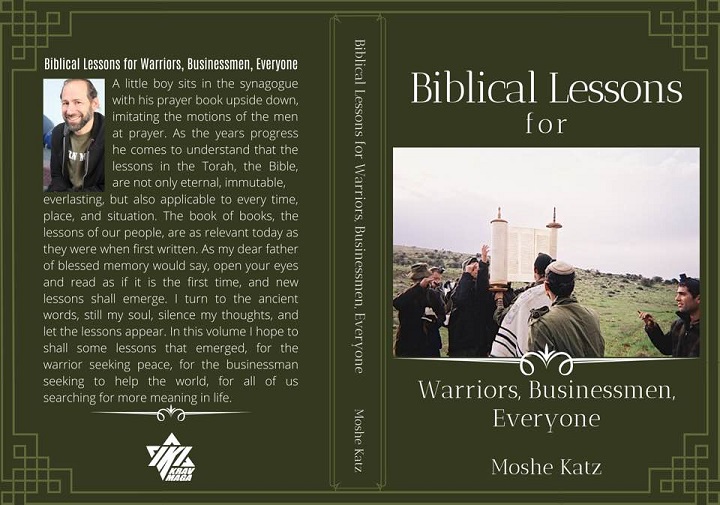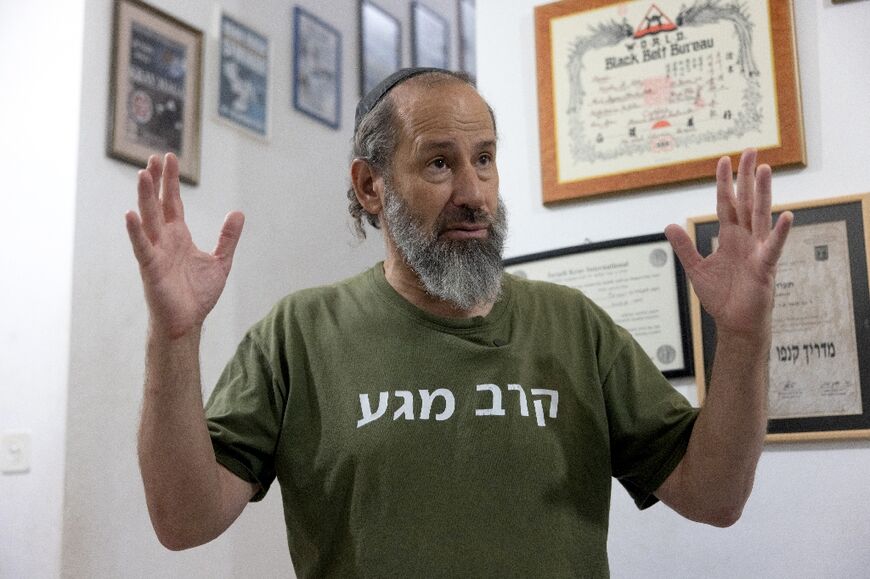- Home
- Krav Maga Blog
- Krav Instructors
- Train in Israel
- Tour Train Israel
- Krav Shop
- DVD
- Kickboxing
- IKI Near Me
- Seminars
- IKI Membership
- On-Line Training
- Krav Maga Training
- Testimonials
- History Krav Maga
- Instructors Page
- Past Blogs
- Spanish
- Italian
- Certification
- Contact
- Holland Seminar
- Vienna Seminar
- Poland Seminar
- Italy Seminar
- Belt Requirements
Moshe Formation of Leadership
By Moshe Katz
January 18, 2025
Many want leadership, few are worthy of it, and even fewer can successfully navigate it. Many will see their lives destroyed by being in a position of leadership, be careful what you wish for. Leadership is not for the weak. We look to Moshe, Moses, as an example of a great leader, in fact Moshe is the only leader we have who is given the title "Rabeinu", our rabbi, or, our leader. Moshe Rabeinu is seen as an ultimate leader in many ways. (I have written a great deal on this topic, please see other blogs, here I wish to add only a couple more points.)
A leader needs many qualities; wisdom, foresight, insight, farsightedness. A leader must be strong, resilient, tough and uncompromising, yet soft, understanding and ready to compromise. A leader must seek peace but not fear war or confrontation. A leader must be many things, and their opposite, all at the same time. And no matter what one does, others will judge him harshly. A leader will never be able to fully satisfy everyone, and everyone will be quick to point out his faults, failings, shortcomings, and mistakes.
In this weeks' Torah portion we are introduced to Moshe; this chapter deals with his entry into this world and the initial formation of his character. Moshe will have a turbulent life; it began tough and got worse as the years went on. His job was not an easy one. In fact, he did everything possible to avoid this position. Not many people have the courage to turn down a job offer from God Almighty, but Moshe did. He tried to quit, but God would not accept his resignation. He offered to give up all his privileges, in fact to be "erased from the book" and be forgotten from history, and yet here we are, still talking about him over, 3,700 years later. Moshe, a man for all ages.
Moshe was born under a bad sign, bad times for the Hebrew people, the future Nation of Israel. The Hebrews were slaves in the land of Egypt. The Egyptians treated them harshly and tried to break their spirit through hard labor. "the Egyptians loathed the presence of the Children of Israel."(Exodus, Chapter 1, 12) The king of Egypt feared an uprising from the Hebrews, and ordered the midwives, "If the child be male, you shall slay him."(verse 16)
Moshe was male, thus, like many Jews in the 3,700 years to follow, he was born with a death sentence against him. From the moment of birth, it was a fight for survival. Welcome to our world!
Amram, a man of the tribe of Levi, went and married the daughter of Levi. (Chapter 2, verse 1) The woman became pregnant and bore a son. She hid him for three months.
"But eventually she could no longer hide him, for fear that the Egyptian neighbors would hear him crying. (and turn him in, just like during the Nazi years). So she took for him a box made of long reeds, and lined it with slime and pitch to make it water-tight. Into this box she put the child and placed it among the reeds by the banks of the river. " (verse 3)
It came to pass that Pharaoh's daughter went to bath in the river, and she found the baby and took him. She took the boy to raise him, and she named him Moshe, meaning he who was pulled from the water.
Moshe was raised in the palace. The rabbis interpreted this as a Divine plan so that Moshe should not grow up with the beaten down mentality of a slave, but rather as a member of the nobility, as a leader of a nation.
Later on, Moshe grows up. He witnessed the brutal attack of a fellow Hebrew by an Egyptian overlord, he felt the pain of a brother, and "when he saw that there was no man with the courage to act, he fought with the Egyptian and slew him and hid the body in the sand." (Chapter 2, verse 12) Pharoah heard of this and wanted to kill Moshe. Once again there was a death sentence hanging on Moshe.
He wanders off to Midian, marries and names his first son Gershom, or Ger Sham, meaning "I was a foreigner over there" referring to Midian and Egypt. Eventually Moshe is chosen by God to lead the Nation of Israel to the Promised Land, a journey that is recorded as having been 40 years.
Now let us analyze some fine points.
Moshe's life began as an outcast. Imagine being born in a time and place where your very existence is illegal, against the royal decree, against the law of the land. You are given no space on this earth! To me that brings memories of the Holocaust. How many Jews were born into a world where it was "illegal" for a Jew to exist! To have a Jew in your home was a crime, to help a Jew was a crime that could be punished with the death penalty for the "criminal" and his entire family. Many Righteous Gentiles paid this ultimate price. As a leading Nazi said, I would not want to be a Jew in this world.
Moshe's life began in hiding. How many Jews over the past thousands of years had to hide, behind locked doors, in cellers and bunkers? fearing for their lives from the mad mobs, the Crusaders, the Cossaks, the...the list is endless. So Moshe begins his life in hiding. His mother hopes that somehow he will survive. This reminds me of the countless Jewish mothers who left their babies with Gentile neighbors, or strangers, hoping that at least their child would survive the Holocaust.
But something else happens here, something positive, something that will help form Moshe into the leader he shall become, something that will help shape the nature of the Jewish people. A stranger comes along, a young woman going for a bath. She hears a baby crying and she reaches out to him, figuratively and literality. She knows immediately that he is a child of the Hebrews.
Moshe at this point in his life, is totally helpless. He is a baby; he cannot fend for himself. He cannot provide for himself, feed himself or fight for himself. He is at the total mercy of strangers. And a stranger comes along. Perhaps it is this early encounter that fostered the feeling, the very nature, of Moshe as a sensitive man, a man who can see the pain of others, those who have no voice, those who cannot speak out for themselves, those who cannot fend for themselves, and he reaches out to them, like Pharoah's daughter he extends his arm. I am here to help you! I am your personal Redemer. I shall defend you, guide you, and lead you to the Promised Land.
Moshe is an old man by the time he is instructed to face the powerful Pharoah and demand "Let me people go!" And then, at this advanced age, he must lead the Nation of Israel through the trials and tribulations of a long desert journey. But this is not only a physical journey to freedom, it is a spiritual journey to freedom. As I speak there is a major negotiation going on to release some of our innocent hostages being held by the Arab terrorists, when they are finally home, they will not be home yet. They will have to undergo a long period of adjustment to return to normal life, to freedom. They will probably be tormented by this ordeal for the rest of their lives, like the survivors of the Holocaust.
So Moshe must lead the people through this double journey, physical and spiritual. But again, we see in his early life the preparation for this. He knew he was not really an Egyptian, this was no secret, as a young man he went out "unto his brethren, and looked on their burdens; and he saw an Egyptian smiting a Hebrew, one of his brethren." (Chapter 2, verse 11). The rabbis write, he saw their hard work and he felt their suffering. He related to them, "one of his brethren".
He knew he was different; he did not belong or fit in. He did not grow up among his own people, did he even speak their language? Culturally he was an Egyptian, but he knew he was not one of them, and they knew as well. There was a politician running for office when I lived in California, Casper Wienberger. He was not Jewish, despite his Jewish sounding last name. When he was asked why he lost, he said, "The Gentiles thought I was, and the Jews knew I wasn't" (The Gentiles did not vote for him because they thought he was a Jew, the Jews did not vote for him because they knew he was not.)
So Moshe our teacher, understood this struggle towards freedom. He was born a slave, raised as royalty and had to find his way towards true freedom. He had to discover himself as a leader. He now must help the sons of slaves transform into a Nation of Warriors, a Holy People unto God. This is a great task. For a long period of time, the journey through the desert, he had to listen to their complaints, their rebellions, their aches and pains, and guide them like a child growing up. He had to help them grow from a slave mentality, from an Exiled Man to a Proud Warrior of the Nation of Israel, ready to fight off all enemies, physical and spiritual. This was a challenge!
This is a true leader. He himself was pulled out of danger by a kind stranger, he learned to stand up for the weak and downtrodden, to guide, to inspire. And yet he himself knew he would not enter the Promised Land.
Moshe is known in all languages, Moshe, Moses, Moises, Musa, Mosze, Moise, etc. His cry of Let my People Go is still a rallying call for freedom, all over the world and thousands of years after his death. This is a man who has had quite an impact, and yet his origins were very humble. Born as a slave, left to the fate of strangers, a leader of men who could speak to Kings and God himself.

Own the book

More Blogs about Moshe
Moshe, the Snake and Krav Maga
Analyzing techniques the biblical way